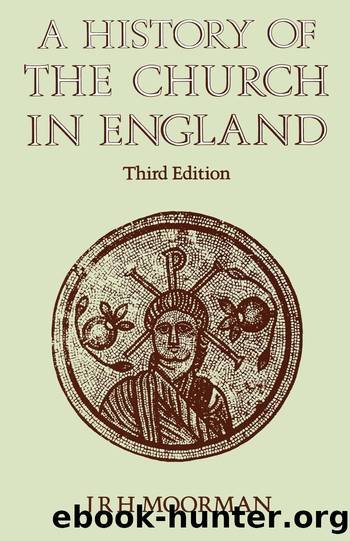A History of the Church in England by J R H Moorman

Author:J R H Moorman
Language: eng
Format: epub
ISBN: 9780819220950
Publisher: Church Publishing Inc.
Published: 2017-05-09T00:00:00+00:00
CHAPTER XV
COMMONWEALTH, RESTORATION AND REVOLUTION (1649â1702)
i. Commonwealth and Protectorate
The execution of Charles I marked the triumph of the Puritans, and they were proud of it. The âman of bloodâ had been removed to where the wicked cease from troubling, and the road lay open to the new and glorious age. Firm government, just laws, and, above all, pure religion were to be established for all generations. The Kingdom of God was at hand.
So thought the more enthusiastic of the Puritans. But the country as a whole was depressed and uneasy. âWhoâ, cried David when God had delivered Saul into his hands, âcan stretch forth his hand against the Lordâs anointed and be guiltless?â The New Age of the Cromwellians looked very fine; but what if it were built on blood? The soldiers may have cheered when Charlesâs head rolled from the block, but upon the country as a whole there settled a sense of horror, of guilt, of shame; and the consciences of many were uneasy. Consequently the little book called Eikon Basilike: the Pourtraicture of His Sacred Majestie in his Solitudes and Sufferings, which appeared almost simultaneously with his death, was eagerly bought and read.1 To the horror of the Puritans, Charles the villain rapidly became Charles the hero and martyr; and Miltonâs reply to this in Eikonoklastes did nothing to stem the flood of popular feeling.
Meanwhile the religious life of the country was in a state of great confusion. Since the abolition of episcopacy there had been no proper organization or control. Most of the incumbents were Presbyterians, but a number were Anglicans at heart who conformed under protest, and a few were Independents. All that the government could do was to issue an order in 1650 to say that everyone must attend some place of worship or a place where religious exercises were held; but that meant very little. Then in 1653 was issued the Instrument of Government1 which was intended to give some measure of toleration. According to this, people were not to be compelled to any âpublic professionâ of their faith, binding them to any particular church, but were to be free to go where they liked and to worship in the way which suited them best. âSuch as profess faith in God by Jesus Christâ, it declared, âthough differing in judgment from the doctrine, worship or discipline publicly held forth, shall not be restrained from, but shall be protected in, the profession of the faith and exercise of their religion.â But there was a proviso which showed that the day of general toleration was still far off, for the act continued: âprovided this liberty be not extended to popery or prelacyâ.
1 It is thought to have been compiled by John Gauden largely from the kingâs own writings. It rapidly went through forty-seven editions and was translated into Latin.
Cromwell was anxious to be broad-minded and tolerant. He did not expect uniformity. âI meddle not with any manâs conscienceâ, he said.2 But there were limits beyond
Download
This site does not store any files on its server. We only index and link to content provided by other sites. Please contact the content providers to delete copyright contents if any and email us, we'll remove relevant links or contents immediately.
| Anglican | Baptist |
| Book of Common Prayer | Calvinist |
| Episcopalian | Inspirational |
| Lutheran | Methodist |
| Pentecostal & Charismatic | Presbyterian |
| Quaker | Seventh-Day Adventist |
| Shaker | Theology |
Angels by Billy Graham(1926)
How To Be Born Again by Billy Graham(1781)
Peace with God by Billy Graham(1689)
Unbroken Curses by Rebecca Brown & Daniel Yoder(1575)
God's Prophetic Symbolism in Everyday Life by Adam Thompson & Adrian Beale(1497)
The School of Biblical Evangelism by Ray Comfort(1438)
Call by Rick Joyner(1430)
Martin Luther: The Man Who Rediscovered God and Changed the World by Eric Metaxas(1399)
Power over the Enemy by John Osteen & Joel Osteen(1354)
Jonathan Edwards: A Life by Marsden George M(1236)
Fresh Wind, Fresh Fire by Jim Cymbala(1234)
Prayers That Bring Healing and Activate Blessings: Experience the Protection, Power, and Favor of God by John Eckhardt(1222)
Liturgy of the Ordinary by Tish Harrison Warren(1220)
The Supernatural Power of a Transformed Mind Expanded Edition: Access to a Life of Miracles by Bill Johnson(1207)
Unmasking the Devil: Strategies to Defeat Eternity's Greatest Enemy by John Ramirez(1206)
An Altar in the World by Barbara Brown Taylor(1195)
Reformation Theology by Littlejohn Bradford(1187)
Seeing the Voice of God: What God Is Telling You through Dreams and Visions by Smith Laura Harris(1142)
Martin Luther by Mansch Larry D.; Peters Curtis H.;(1133)
